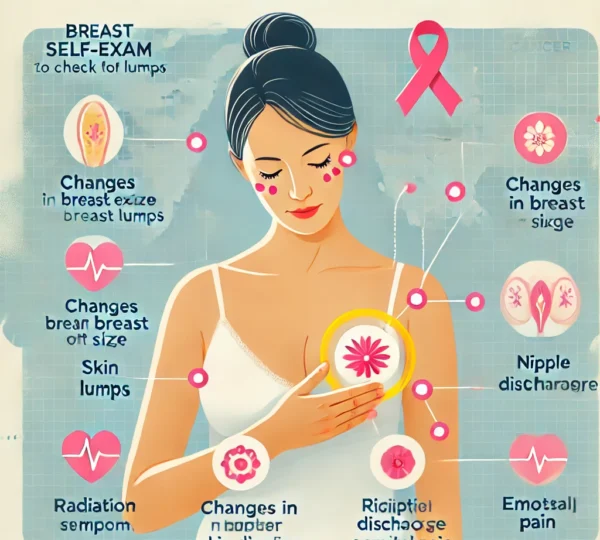Breast Cancer: Don’t Let It Scare You, Let’s Beat It Together!
Breast cancer is a common type of cancer that starts in the breast tissue. It is the most common cancer among women in India, affecting thousands each year. While it can affect women of all ages, it is more frequent in those over 50. Recognizing symptoms early can help with timely treatment and improve outcomes.
Common Symptoms of Breast Cancer
The main symptom of breast cancer is a lump in the breast, which may feel different from surrounding tissue. Other symptoms to watch for include:
- Changes in breast size, shape, or color
- Skin dimpling, causing an “orange peel” look
- Nipple discharge, sometimes bloody
- Nipple pulling inward (retraction)
- Pain in the breast or armpit area
Why Early Detection Matters
Early detection can improve the chances of successful treatment. Understanding how to check for lumps and other symptoms can make a significant difference.
What Causes Breast Cancer?
The exact cause of breast cancer is still unknown, but several factors can raise your risk:
- Age: Breast cancer is more common in women over 50.
- Family History: A family history of breast cancer, especially among close relatives, increases risk.
- Personal History of Breast Cancer: Having breast cancer in one breast can raise the risk of it developing again.
- Radiation Exposure: Radiation treatments to the chest can increase the risk.
- Genetic Mutations: Specific genetic mutations, like BRCA1 and BRCA2, are linked to higher breast cancer risk.
For those at higher risk, learning lifestyle tips for prevention can help manage and reduce this risk.
How is Breast Cancer Treated?
Treatment varies based on the stage and type of breast cancer. Options include:
- Surgery: Surgery removes cancerous tissue. Types include lumpectomy and mastectomy.
- Radiation Therapy: This treatment uses high-energy rays to kill cancer cells, often used after surgery.
- Chemotherapy: Medication is used to kill cancer cells, often for more advanced cancers.
- Hormonal Therapy: For hormone-sensitive cancers, this therapy reduces the effect of hormones on cancer cells.
- Targeted Therapy: This uses drugs to target specific cancer cells, with fewer side effects than some traditional methods.
The Role of Emotional and Psychological Support
Breast cancer treatment can be emotionally challenging. Patients are encouraged to seek emotional support and join support groups to help manage the mental and physical aspects of their journey. These groups provide encouragement, resources, and a sense of community.
Conclusion
Breast cancer is a serious condition, but with early detection and modern treatment options, many women recover and lead full lives. If you think you may have symptoms of breast cancer or if you’re at a higher risk due to family history, seeing a doctor promptly can help you get a diagnosis and personalized care plan. With the right support and timely treatment, many women successfully manage and overcome breast cancer.
I hope this article has helped you understand endometriosis better. You can consult a doctor for more information



